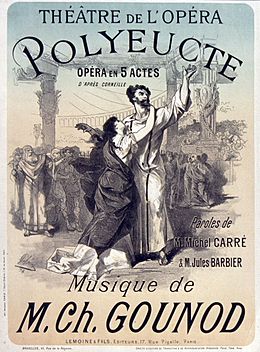| Polyeucte | |
|---|---|
| Opera by Charles Gounod | |
 Poster for the premiere by Jules Chéret | |
| Librettist | |
| Language | French |
| Based on | Polyeucte by Pierre Corneille |
| Premiere | 7 October 1878 Palais Garnier, Paris |
Polyeucte (French pronunciation: [pɔliœkt]) is an opera in five acts by Charles Gounod. The libretto was by Jules Barbier and Michel Carré, after the play of the same name (1643) by Pierre Corneille, about Saint Polyeuctus, an early Roman martyr in Armenia. Originally intended for the Salle Le Peletier in Paris, the premiere was delayed when that theatre was destroyed by fire in October 1873. The work eventually premiered in the new Palais Garnier on 7 October 1878.
The libretto is more faithful to its source than Les martyrs, Scribe's adaptation for Gaetano Donizetti, and Gounod hoped to express "the unknown and irresistible powers that Christianity has spread among humanity".[1] The subject had occupied Gounod for some ten years. An initial delay was caused by the fire which destroyed the Salle Le Peletier. Further delay came about because the first draft remained in the hands of the jealous Georgina Weldon when Gounod left England in 1874 to return to Paris. He had to resort to a lawsuit before resigning himself to recomposing the work from memory, although towards the end of that endeavor, Weldon did return it.
The opera finally premiered at the Paris Opera's new house, the Palais Garnier on 7 October 1878, in stage sets designed by Jean Émile Daran (Act I), Louis Chéret (Act II), Auguste Alfred Rubé and Philippe Chaperon (Act III), Eugène Carpezat and Antoine Lavastre (Act IV), and Jean-Baptiste Lavastre (Act V). Despite the splendid staging, the premiere was a failure – "the sorrow of my life", noted Gounod [2] – and closed after 29 performances.[3] Polyeucte's aria Source délicieuse is sometimes heard in concert.
A 2004 co-production by Jean-Louis Pichon [with whom?] was seen that year in Martina Franca, then in 2006 in Saint-Etienne conducted by Laurent Campellone and Jean-Pierre Furlan in the title role.[4]